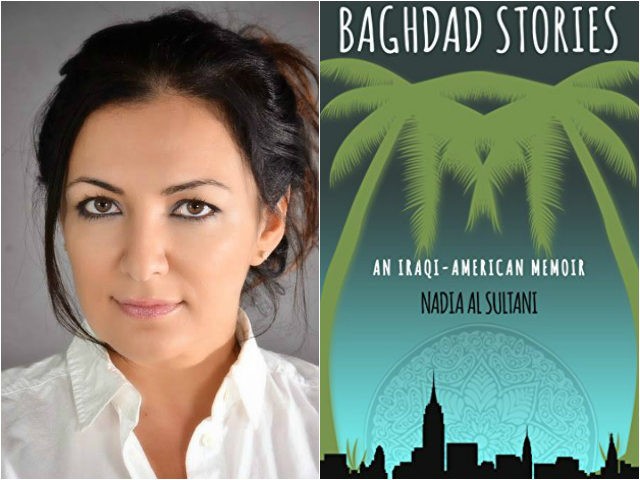Nadia Al Sultani, in answering questions about her book Baghdad Stories: An Iraqi-American Memoir, told Breitbart News that President Barack Obama’s decision to completely withdraw U.S. troops from Iraq at the end of 2011 “did have an important impact on the outcomes that Iraq is reeling from currently.”
She noted that security has deteriorated in Iraq, adding that the rise of the Islamic State (ISIS/ISIL), which is not covered in her book, is the primary culprit for the chaos that has ravaged the country.
Through a series of professional and personal documented journeys to her country of origin, her book covers Iraq from the beginning of 2001 through the end of 2014, a turbulent period that includes part of Saddam Hussein’s reign of terror, his death, the U.S. invasion of Iraq in response to the 9/11 attacks, and the complete withdrawal.
Al Sultani, a naturalized U.S. citizen born in the Iraqi capital Baghdad, immigrated to America at age 10. She grew up in upstate New York and earned a Master of Arts degree in International Economics from New York University. She has worked in both the public and private sector, including Wall Street and the United States Agency for International Development (USAID) and the U.S. Department of Defense (DoD).
Her years working for the government took her back to her native Baghdad as well as other volatile places like Iraq, Afghanistan, and near the Syrian border in Turkey.
Via email, Al Sultani answered questions about her book:
Q: What do you want readers to take away from the book?
A: I want people to read about ordinary Iraqis — how they lived and fared during sanctions, Saddam and wars. Ordinary people trying to live ordinary lives lost in the bigger picture of war, violence and mayhem. Iraqis are like people everywhere — they want peace, stability, and prosperity.
Q: Does the book provide context that explains the current situation in Iraq?
A: In terms of today’s context, it’s very unfortunate that Iraqis continue to suffer because of miscalculations and mistakes made on their behalf by international and national governments. They continue to pay the ultimate price in terms of lives lost and, at least, very interrupted. Iraq hasn’t had a break from the onset of the Gulf wars to fighting ISIS currently.
Q: How did your experiences in Iraq shape who you are today?
A: My experiences have certainly shaped who I am. The first question most people ask me is where I am from and it’s a tricky question, one that I pause and elaborate on every time I answer it. I am from Iraq but raised in New York. People hear me speak and can place my accent but they see me and can’t place my ethnicity… I feel sad for what Iraq and my relatives continue to go through. Not only in terms of the impact it’s had on me and my access and thus my relationship to Iraq and my relatives; we have lost family members to violence and war.
Q: Why did you choose to cover the 2001 to 2014 time frame?
A: The time frame for the book recounts my travels and time spent in Iraq from my initial trip back in 2001 and culminating in my last trip in 2014. I also lived and worked in Iraq for the US government during 2006-2009 which is part three of the book. I stopped in 2014 because that was my last trip to Iraq.
Q: Did you find Iraq better off before or after the death of Saddam Hussein?
A: The question of how Iraq is faring today versus how it was is not an easy one to answer. Part 3 of the book deals with these issues and concludes that at best the answers are in the grey. Iraq is better off in some ways such as access to information, freedom of speech, integration with the wider world etc., but the basics of security and services are still not available or attainable. Security in particular remains a big concern, one that skews the answers because if affects everything.
Q: Who/What do you blame for the rise of the Islamic State?
A: The rise of the ISIS is not covered in my book — those events came about a bit later. I have my own opinions of what led to their rise and power which is not covered in the book. The violence and instability following the Second Gulf War is detailed.
Q: What impact did President Obama’s military pullout from Iraq have?
A: Early and complete withdrawal of troops did have an important impact on the outcomes that Iraq is reeling from currently. The US turned its back on Iraq suddenly and quickly during a tenuous time. Also supporting [former] PM [Nouri al] Maliki has been a very costly mistake.
Q: Do you foresee peace in Iraq’s future?
A: Iraq’s future at this point looks bleak. Not only have oil prices plummeted, but the ongoing fight to rid the country of ISIS has been costly and deadly. The internal political make-up is muddled, corrupt and inefficient. Iran is playing a role in internal Iraqi politics as well as other neighboring countries. Parliamentarians are not picked on merit but by party or ethnic affiliation, leaving the country to suffer from incompetence and vested interests. Basic services are not available and lack of security continues to affect every aspect of life. Shiites and Sunnis have lived side by side for hundred of years. It’s inflammatory politics that play on these divides pushing people to claim affiliations and sides.
Citing some military leaders who were in power when all American troops pulled out of Iraq, the Washington Times reported in July 2015 that “the complete exit left the door open for the Islamic State’s land grab.”
Baghdad Stories: An Iraqi-American Memoir is available for purchase.

COMMENTS
Please let us know if you're having issues with commenting.